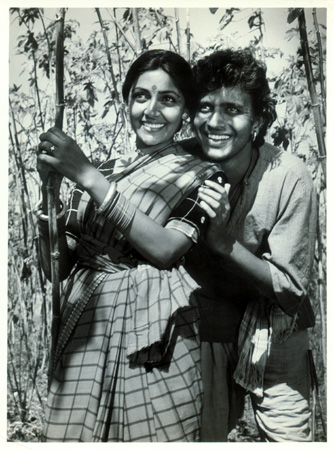SCREEN, BOMBAY - 23 JAN, 1981
The title of S.K.Films Enterprises ‘Hum
Paanch’, based on Kannada director Puttanna Kanagal’s
‘Paduvaraahalli Pandavaru,’ has an obvious connection
with the story of the five Pandavas in India’s great epic,
the Mahabharata. Two characters in the film bear the names of
two of the five Pandavas in the epic – Arjun and Bheem.
The name of the all-important character in the Mahabharata,
(Lord) Krishna, is also the name of the film’s key character
who is instrumental in bringing five oppressed persons together
to wage a battle against tyranny and evil. Barring these superficial
features, there is no resemblance between producer Surinder
Kapoor’s ‘Hum Paanch’ and the Vyas-written
epic, the Mahabharata, except in a few dialogues which are meant
to convey a part of the philosophy propounded in the Geeta.
The main characters in the film look neither representative
of the starkly earthy present nor genuinely resemble mythological
prototypes in the Mahabharata. The fault is not of the artistes
who have enacted these characters but of the writers and the
director who have not been able to lend credence to the tale
or present on the screen a believably effective amalgam of the
earthy present and the mythological past.
In ‘Hum Paanch’, the forces of evil and tyranny
are epitomized in the person of the wealthy zamindar, Thakur
Veer Prasad Singh (Amrish Puri) and his crafty aide Lala Nayansukh
Prasad Shrivstav (Kanhaiyalal). The Thakur has turned his younger
brother Krishna (Sanjeev Kumar) into a drunkard so that he,
the Thakur, can enjoy the entire property unhindered. The Thakur
has had no compunction bringing about the downfall of his own
sister (Geeta Siddhartha) and has sent her son Arjun (Raj Babbaar)
away from the village.
The Thakur has turned his best friend into a gambler and forced
him to sever ties with his son Suraj (Naseeruddin Shah). The
Thakur has also lured Sundariya (Shabana Azmi) into a mock marriage
but has abandoned her the moment he knew she was pregnant, Unable
to stand the shock, Sundariya loses her mind and her two brothers
(Uday Chandra and Gulshan Grover) seethe with impotent rage.
The Thakur has also mercilessly whipped his most loyal servant
Bheem (Mithun Chakraborty), who has asked for a lilttle quantity
of gold in order to marry Lajia (Deepti Naval) with whom he
is in love. Bheem leaves the servicdes of the Thakur, swearing
revenge, while the Thakur turns his lecherous eyes on Lajia.
FALSE PROMISES
In conjunction with his son Vijay (Roopesh Kumar) and Vijay’s
sweetheart Nishi (Aruna Irani), the Thakur manages to swindle
the villagers of their ornaments and cash on the basis of false
promises.
Only the drunkard Krishna has kept count of his elder brother’s
crimes. When they total a century, Krishna asks the five (Bheem,
Arjun, Suraj, and two brothers of Sundariya), whom he has united,
to strike. Good triumphs over evil and the tyrannical Thakur
and his henchmen are ultimately humbled.
Sanjeev Kumar as Krishna, the father figure in the narration,
is handicapped because of a weakly written role. Most of the
time he is seen drinking, wandering around aimlessly and singing.
Naseeruddin Shah, as Suraj, has some good lines to deliver,
which he does forcefully and effectively. Mithun Chakraborty
as Bheem, and Raj Babbar as Arjun are adequate. Shabana Azmi,
as Sundariya, shines among the top artistes, and has essayed
her part with understanding. So has character actor Kanhaiyalal,
who, as Lala Nayansukh Prasad, runs away with acting honors
in a role that fits him like a glove. He has some of the best
lines of dialogue and he has made the most of them. The liberal
use of the English Word ‘connection’ in his dialogue
goes well with the audience, which is conversant with that language.
It may prove to be a handicap, however, for spectators who are
not conversant with English. Amrish Puri, who enacts the tyrannical
Thakur, has striven hard to live the part. Other artistes pass
the bill.
The dialogues penned by Dr. Rahi Masoom Raza are quite forceful
and to the point and lend effectivity to the story which is
not very convincing as it is unfolded on the screen.
Shot mostly outdoors, the photography and other technical aspects
of the film have polish and finesse. The musical score of Laxmikant
and Pyarelal, in song compositions, has a pleasant lilt in keeping
with the situations in which the songs are placed.





